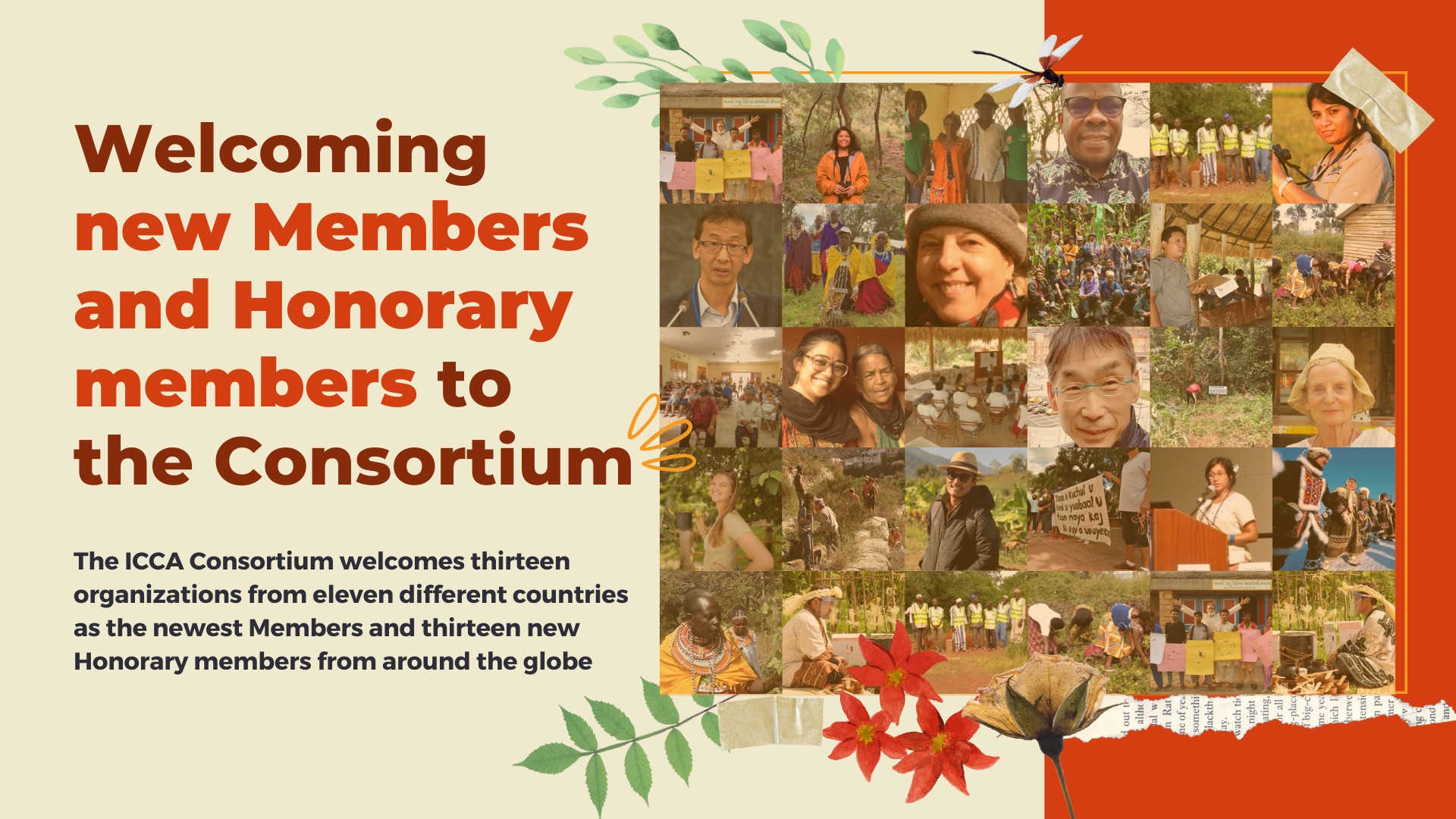By Alison Powell, Administration Coordinator, ICCA Consortium
The ICCA Consortium Membership Committee is pleased to announce that the first review period of ICCA Consortium Member applications and Honorary member nominations for 2022 has ended, and no objections arose. The following organizations and individuals have joined the membership as our newest Members and Honorary members, respectively.
NEW MEMBERS
Indigenous Peoples’ and local community organisations, federations, networks and movements
Sendenyu Community Biodiversity and Wildlife Conservation Committee is comprised of members of the Rengma Naga tribe in Sendenyu village in Kohima district, India. The village council started the Committee in 2001 and empowered it to manage conservation activities for 2200 hectares where strict rules about hunting and resource use are enforced. The Committee has used plantations of fruit trees to attract birds, fencing of some vulnerable areas and erecting signboards about the rules and regulations for the sanctuary, and regularly monitors the protected area.
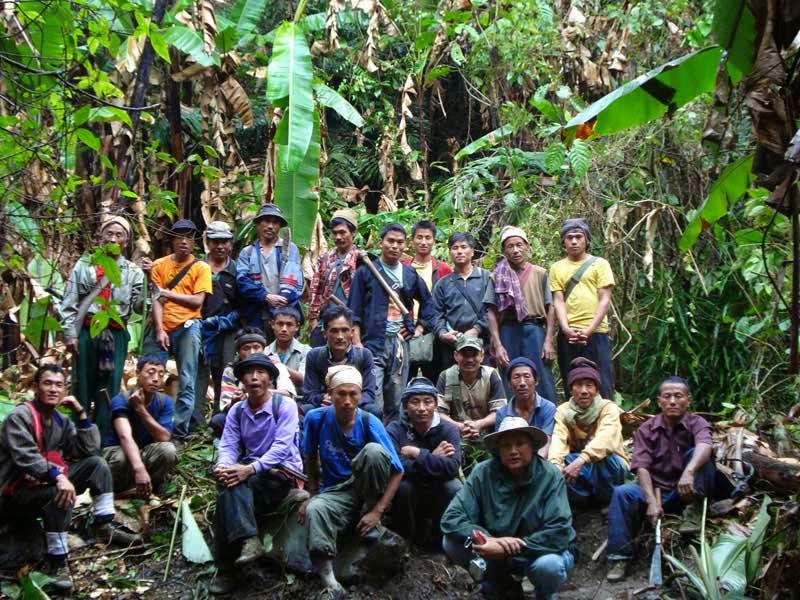
© Sendenyu Community Biodiversity and Wildlife Conservation Committee
Civil society and non-governmental organisations, networks with mixed composition and non-governmental research institutions focused primarily at local, national and/or regional levels
Action Pour le Développement Durable (ACDD) is a non-profit and non-political organisation in Cameroon with the mission to involve youth in the process of sustainable development. More specifically, they work on the promotion and protection of Indigenous and local community rights, accompanying women in the development of income-generating activities, conservation of biodiversity, and support for increased value of non-timber forest products. Currently, they are supporting the Indigenous Bagyeli community to secure legal territory rights in Cameroon.
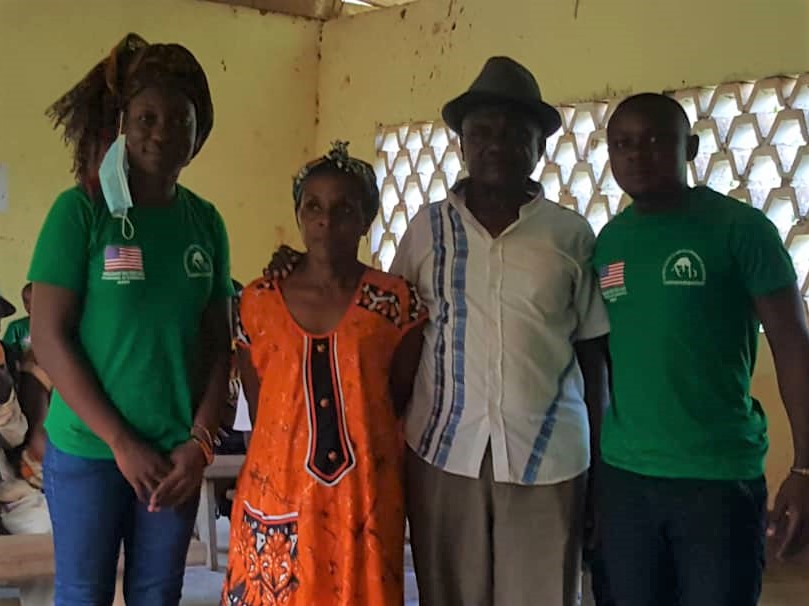
Awareness visit © ACDD
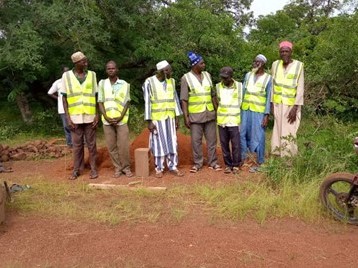
Gathering of members of ASAPAC/BF for an eco-monitoring tour in the sacred forest of Kalwaka
© ASAPAC/BF
Association des Aires et territoires du patrimoine Autochtone et Communautaire – Burkina Faso (ASAPAC/BF) is an association in Burkina Faso focused on territories and areas conserved by Indigenous Peoples and local communities and effectively serves as the national ICCA network. They work directly with local communities towards the legal recognition of ICCAs, rights of local communities to decide on their ICCAs, and inclusive governance and documentation of ICCAs in Burkina Faso. Each member community organizes itself for the conservation and development of its ICCA and is involved at all levels of the association. The association co-organised the first national assembly in Burkina Faso in September 2021 with ICCA Consortium Member NATUDEV.
Centre for Environmental and Minority Policy Studies (CEMiPoS) aims to support and empower Indigenous peoples and other minorities in Japan, with a special focus on the Ainu Indigenous people of Ainu Mosir/Hokkaido. As the only English-language research centre specifically working for Ainu rights, CEMiPoS brings together activists, academics, and artists on a global level. They work with an international outlook in order to both put Ainu issues on the global agenda and find allies and contribute to Indigenous liberation struggles elsewhere. In August 2021, CEMiPOS contributed to the ICCA Consortium’s solidarity exchange on Indigenous decolonisation and sustainable self-determination, held in conjunction with the 2021 International Day of the World’s Indigenous Peoples.
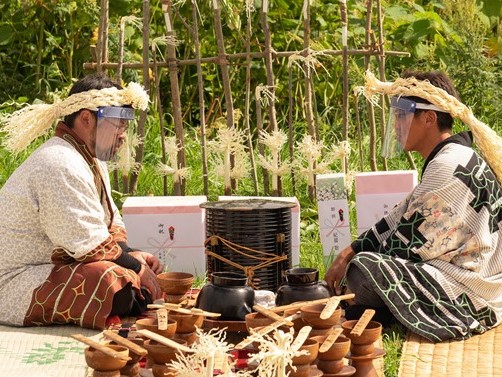
The kamuycepnomi ritual includes a traditional homemade sake called tonoto, which can be seen in the pot on the picture. © CEMiPoS
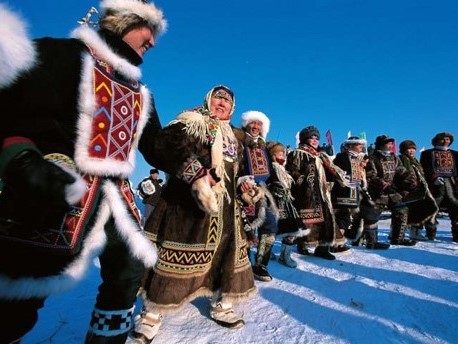
© CSIPN
Center for Support of Indigenous Peoples of the North (CSIPN) aims to provide education, information, legal support and consultancy for the Indigenous Peoples in Russian North, Siberia and Far East, including the circumpolar/Arctic region. Its ultimate objective is to ensure Indigenous Peoples’ sustainability by being directly involved in development matters and to ensure their participation in decision-making and political processes at the national, regional and local levels.
Indigenous Movement for Peace Advancement & Conflict Transformation (IMPACT) is a not-for-profit organization in Kenya, founded in 2002 by Il Laikipiak Maasai leaders and registered as a trust in 2003. Its work has focused primarily on the Indigenous Peoples of Marsabit, Isiolo, Laikipia and Samburu. IMPACT convened the Pastoralists Alliance for Resilience and Adaptation in Northern Rangelands, a network of more than 20 Indigenous Peoples’ civil society organisations in the Northern and Southern Kenya rangelands. They also raise awareness about the need to protect the Ewaso Nyiro Ecosystem, which supports more than 3.5 million people in the region, through annual Camel Caravans and the promotion of environmental peace and collaboration. IMPACT is one of the nine Indigenous- and community-led organisations supported by the GEF Inclusive Conservation Initiative.
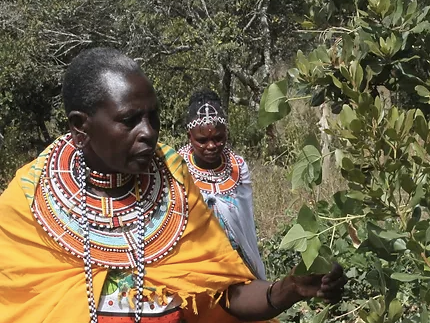
© IMPACT
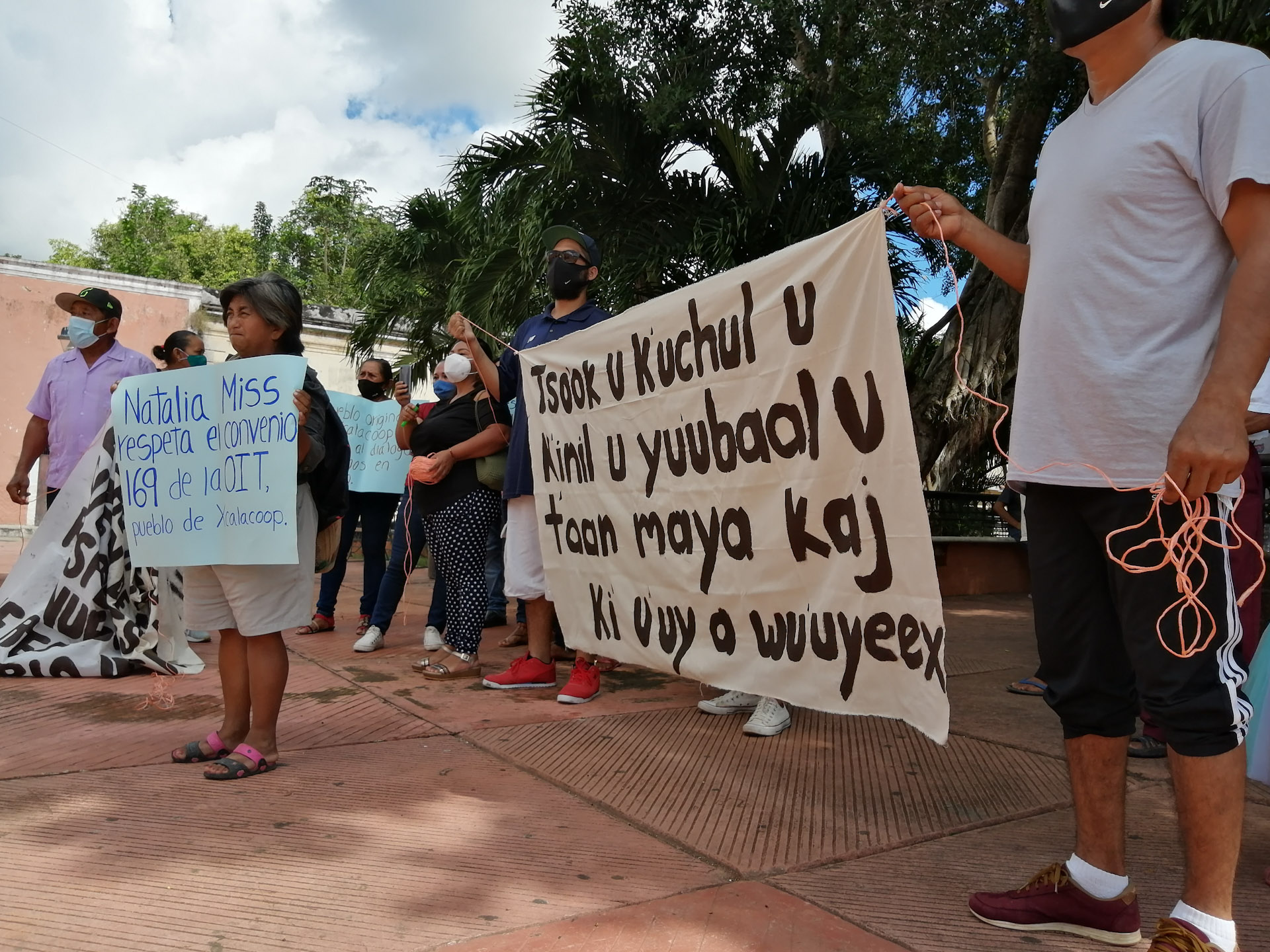
© Kanan Derechos Humanos Asociación Civil
Kanan Derechos Humanos Asociación Civil is a non-profit civil association that began in 2020 and became legally constituted in 2021 in Mexico. Its mission is to defend and promote human rights in the Yucatan Peninsula through strategic litigation, training and strengthening organisation processes in local communities. Kanan works with local Indigenous and fishing communities in the defence of territory and natural resources as a human right.
MEMOLab (Laboratorio de Arqueología Biocultural) is a space for research and communication for medieval archaeology in Spain. MEMOLab’s fundamental interest is focused on the recognition of historical processes in relation to the extraction and use of natural resources. They use documentation and research with direct social and environmental impact on historical and traditional irrigation systems, not only as an example of socio-ecosystem restoration, but also as a tool for social intervention. They support traditional and historical irrigation communities at the local level through the promotion of exchanges and networking at regional, national and international levels. MEMOLab is also creating a collaborative map of the historical and traditional irrigation systems of Andalusia: https://regadiohistorico.es.
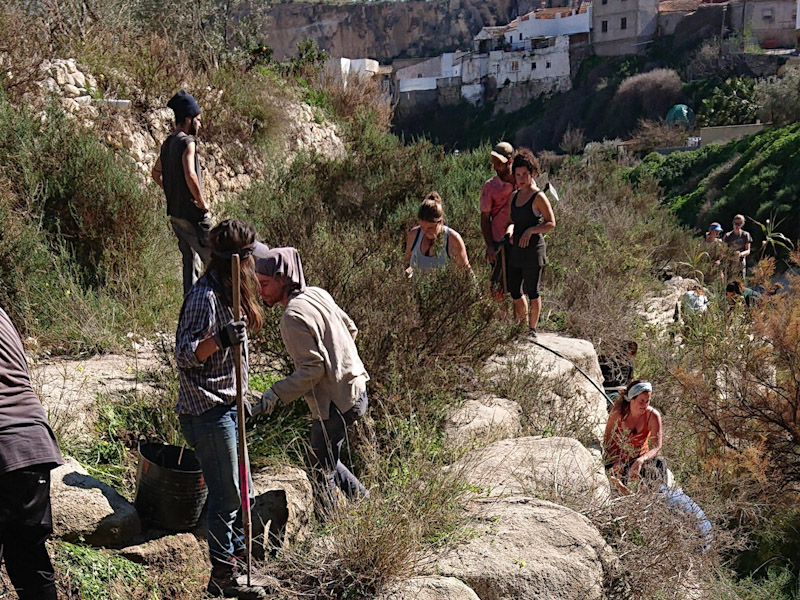
Joint restoration of a traditional irrigation channel in the village of Sorbas, Almería (southwest Spain), by volunteers and the local community. © MEMOLab
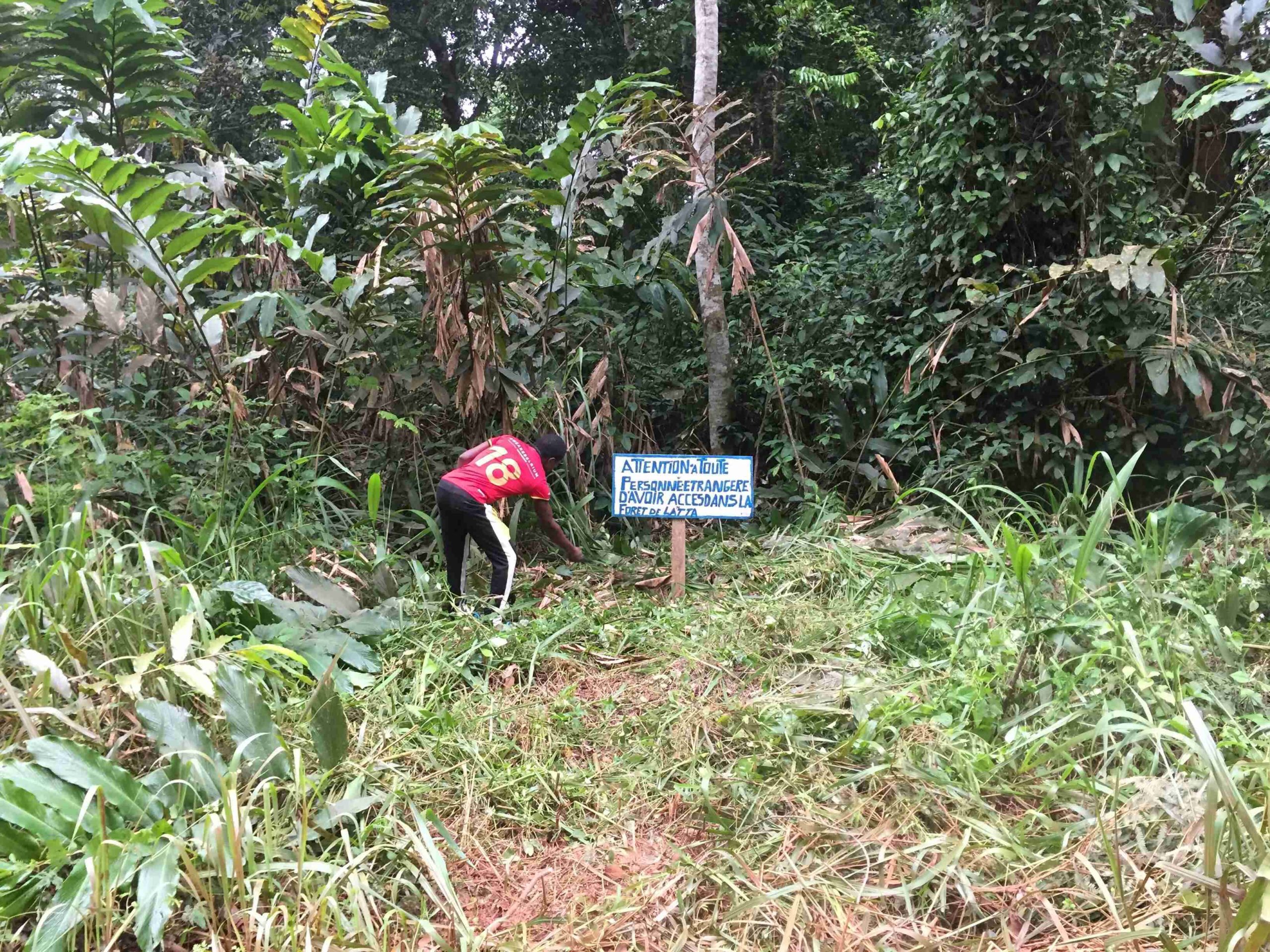
© NADA
Nsombou Abalghe-Dzal Association (NADA) is a non-profit organisation in Gabon advocating for the rights of rural Gabonese communities. They are particularly interested in raising awareness and fighting for the rights of the Massaha community by asking the government of Gabon to recognise their lands as a community protected area to prevent logging in their sacred forests. In January 2022, the ICCA Consortium issued an alert and a press release in solidarity with the Massaha community.
Red de Patrimonio Biocultural aims to spread knowledge of the ethical-philosophical, scientific, organizational, technological and artistic contributions of the Indigenous Peoples of Mexico. The network is focused on the management of biodiversity, agro-diversity and water with more than 10 years of uninterrupted work bringing together local communities and a team of academic advisors. They are also involved in advising other civil society organizations to share informed public opinion and publications on biocultural heritage issues.
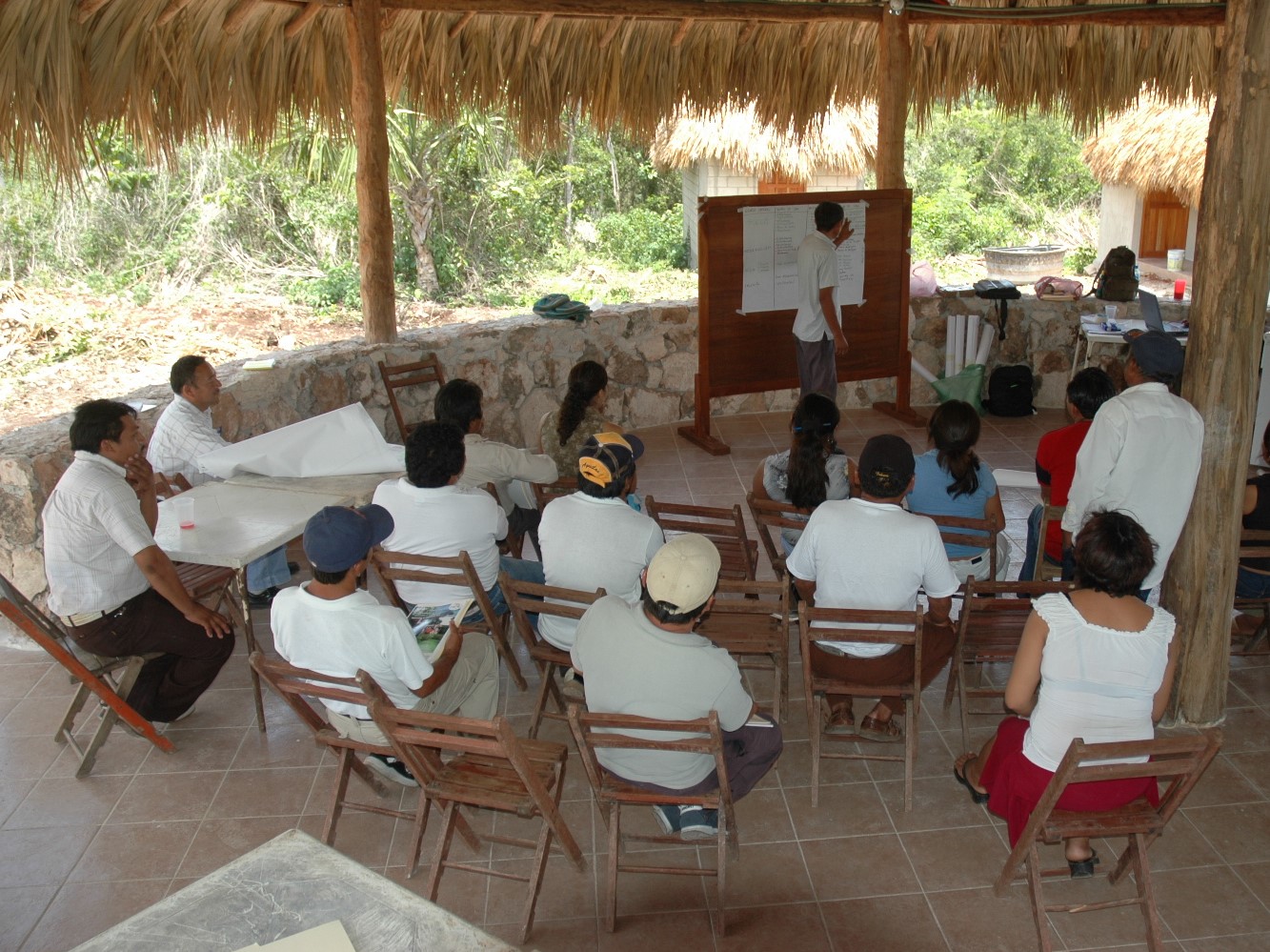
Meeting of communities with ecotourism projects in José María Morelos, Mayan Zone of Quintana Roo © Red de Patrimonio Biocultural
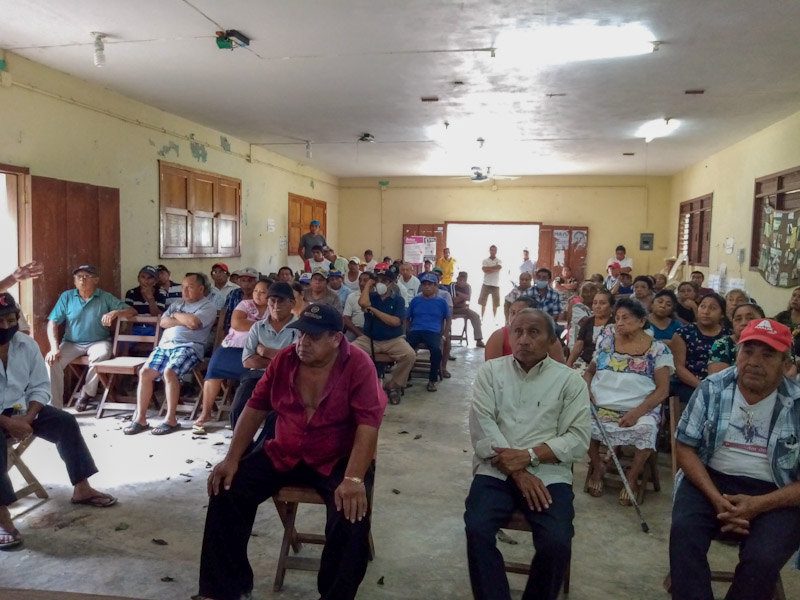
© REPSERAM
REPSERAM (Network of Ejidos Producers of Environmental Services Ya’ax Sot’ Ot’ Yook’Ol Kaab, A.C.) is focused on strengthening territorial management capacities of communal land (or ejidos) in the municipality of José María Morelos, Quintana Roo, Mexico. It was established as a civil society association in 2010 and is currently made up of 35 ejidos. REPSERAM positions themselves as key social actors to safeguard sustainable livelihoods, the resource base of ejidos and cultural identities. The network is characterized by its collective decision-making through regional assemblies that organize together with a board of directors, a council of advisors, and an operational technical body made up of young people from the region.
Talent Des Femmes Autochtones Rurales / Maharifa Ya Wa Mama Vijijini (MAARIFA) promotes the socio-economic empowerment of Indigenous and rural women in North Kivu and South Kivu in the Democratic Republic of Congo. They work with Indigenous leaders as well as lawmakers to change norms and legal land codes to improve land access for women, with an emphasis on ecosystem protection and maintenance. In addition, they support community activities to fight against deforestation and climate change through initiatives like community agroforestry. They also promote community medical camps, equipment to help diversify income, and savings and loan associations.
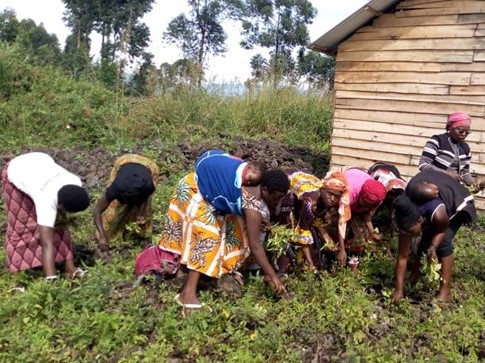
© MAARIFA
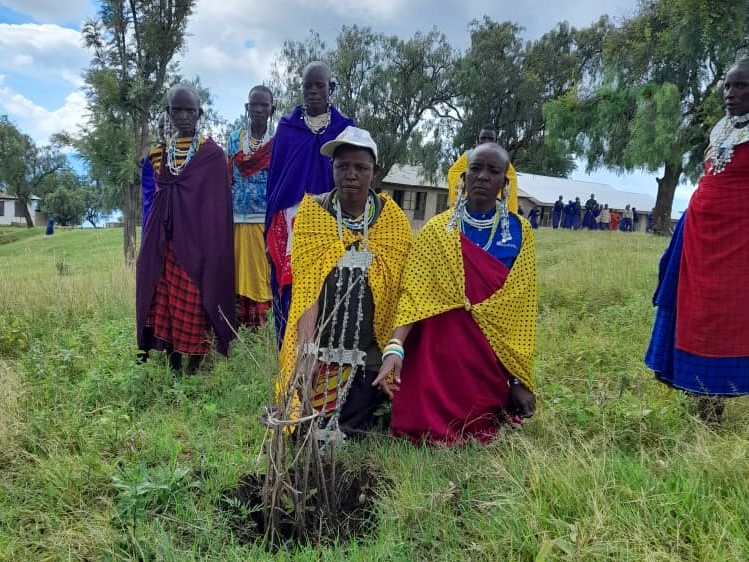
Tree planting © TNRF
Tanzania Natural Resource Forum (TNRF) is a non-governmental organisation in Tanzania on a mission to bring together diverse stakeholders and improve communication and understanding between them. They are comprised of over 6000 members who work together to improve natural resource governance for more sustainable rural livelihoods and better conservation outcomes. From 2018-2022, TNRF has served as the national partner organisation for the Global Support Initiative for ICCAs (GSI) with the UNDP GEF Small Grants Programme, through which it has supported the establishment of an ICCA database for Tanzania and 25 projects with communities and local organisations, including several ICCA Consortium Members. Watch a short video (in Swahili) about one such community in the Enguserosambu Forest in Loliondo.
New Honorary members
Isis Alvarez is a Colombian biologist and MSc in Environment and Resource Management. She worked for the Global Forest Coalition (GFC), including as Senior Gender Advisor and Unsustainable Livestock Campaign Coordinator, from 2011 to 2021. Isis has been active in different environmental intergovernmental processes as a civil society representative advocating for local communities’ and Indigenous Peoples’ rights, women’s rights, and ICCAs, among others. She was an interim communications officer in the early years of the ICCA Consortium and has remained a close collaborator since 2011.
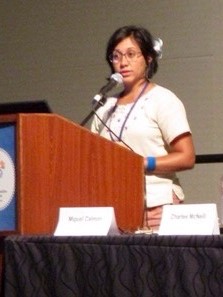
© Isis Alvarez
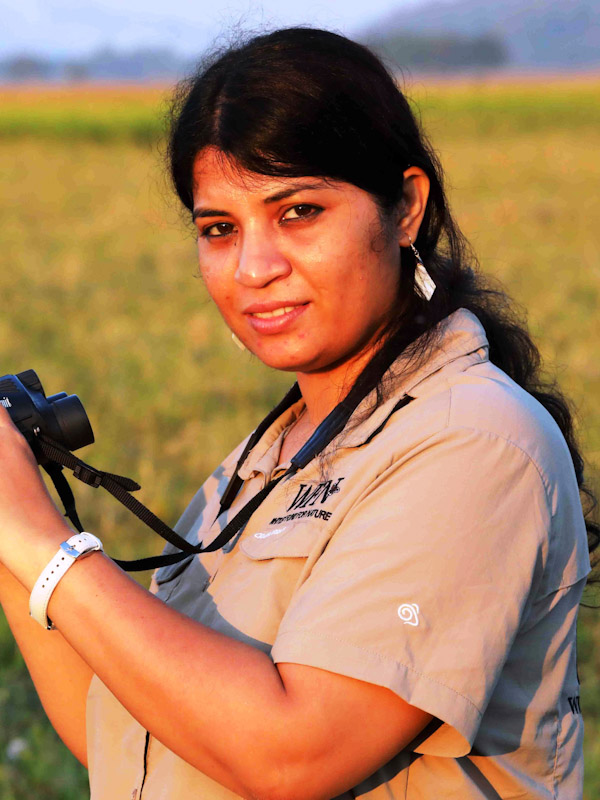
© Purnima Devi Barman
Purnima Devi Barman a wildlife biologist now globally known as the Stork Sister, has led one of the most unique conservation success stories in the world, with the reversal of the Greater Adjutant Stork from persecution and the brink of extinction, to being revered as a national identity. The success of this work is thanks to the inclusion of people as the stewards of the Greater Adjutant or Hargila in Assamese. Purnima devoted her life to changing the fate of an endangered species the world forgot, by championing local communities and empowering and giving voice to over 10,000 rural women by nurturing an all-women “Hargila army” movement. Purnima has been recognised with several national and international awards, including the 2016 UNDP India Biodiversity Award and 2017 Whitley Award.
Natalie Campbell is a land and forest tenure specialist who has worked towards increasing security and recognition of tenure rights for local communities and Indigenous Peoples for almost a decade. Currently based in Lao PDR, as the Regional Adviser on Customary Tenure and Gender for the Mekong Region Land Governance Project, she is working on complex land ownership systems in the context of the rapidly changing natural and political environment. Previously, Natalie has worked for the Rights and Resources Initiative, working on securing collective forest tenure in Indonesia, India, Nepal and elsewhere. She also worked for the International Land Coalition, IFAD and Bioversity International. She holds a Master’s of Development from the Institute of Development Studies, University of Sussex, focused on collective forest tenure in India’s Forest Rights Act. Growing up in India, Indonesia and the USA, Natalie is both a global citizen and deeply grounded in the lives of those with whom she has lived and worked.
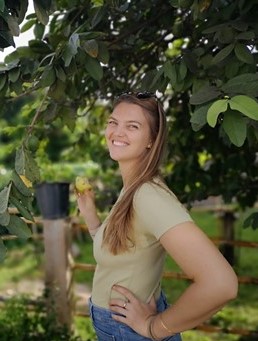
In a guava orchard in Xiengkhouang, Lao PDR. © Natalie Y. Campbell
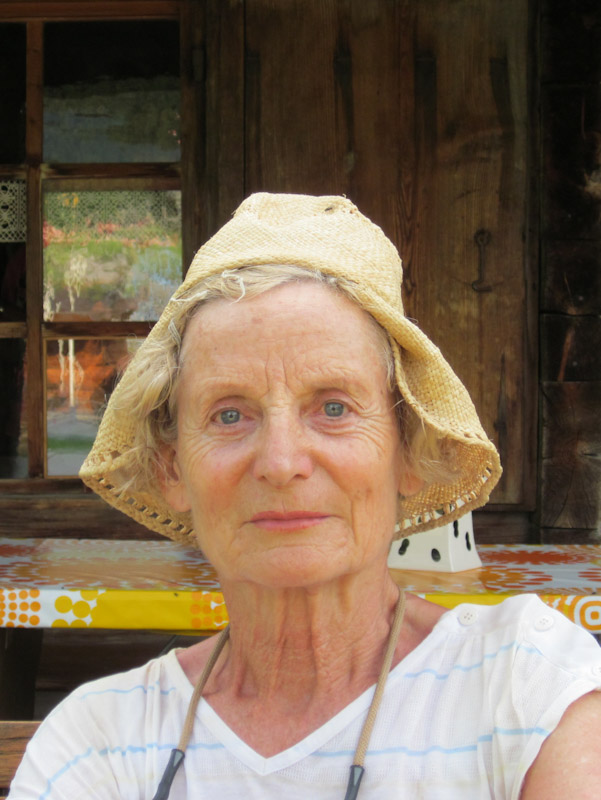
© Barbara Ehringhaus
Barbara Ehringhaus was born in 1938 and has lived and worked in many parts of the world, doing sociological and political research as well as environmental education and organisation. She participated in mapping Indigenous territories and resource conflicts (University of Kassel, Germany) and in 1987, joined the Geneva NGO Indigenous Peoples’ Centre for Documentation, Research and Information (Docip) as a volunteer interpreter and facilitator for Indigenous Peoples’ sessions at the (now defunct) UN Commission on Human Rights, particularly during the long negotiation of the Declaration of the Rights of Indigenous Peoples. Since 1986, she has been a member of IUCN Commissions, participating in numerous workshops, regional and global conferences. More recently, she has been involved in Alpine protection as president of the tri-national NGO ProMONT-BLANC, aiming at transfrontier conservation of the vulnerable top of the Alps.
Ruchinilo Kemp is an Indigenous member of the Rengma Naga tribe and a development professional with over seven years of experience working with Indigenous and rural communities in Rajasthan and Nagaland (India) on forest and pastureland conservation and management, rural enterprise development to improve people’s livelihoods and strengthening community institutions for common resource management, gender equity and participation in decision-making processes. He is currently involved with the Rengma Council in developing the community development vision of the Rengma Naga Community in Nagaland. He is passionate about a social enterprise approach in addressing the key issue of conservation and livelihood.
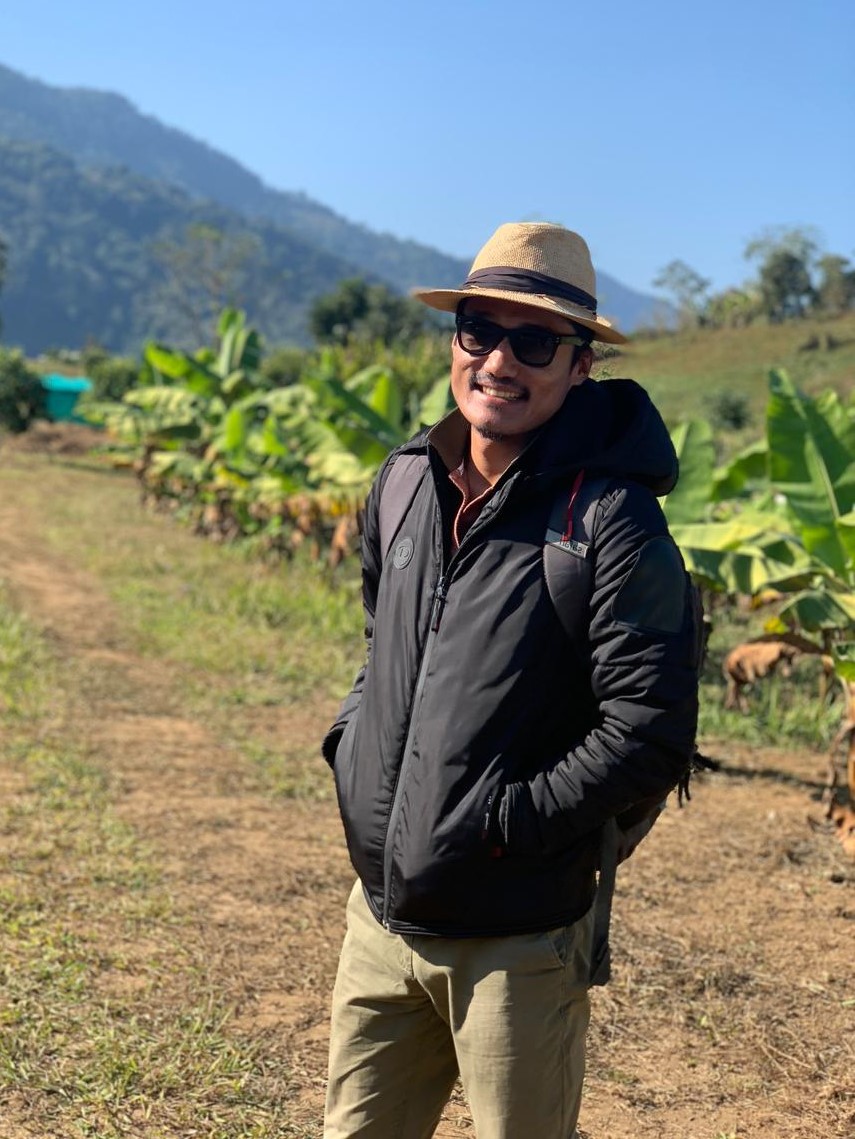
© Ruchinilo Kemp
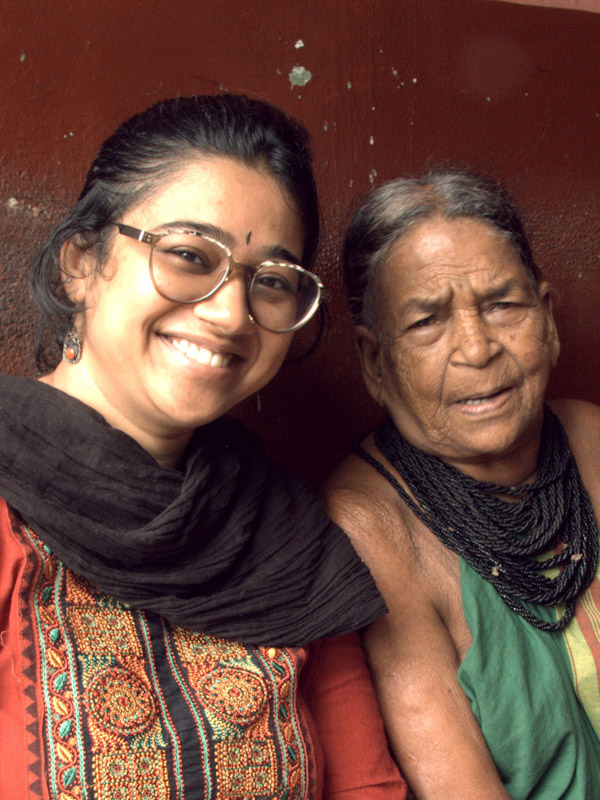
Apoorva Kulkarni with community member Shri Sukri Bommagowda of the Halakki tribe. © Apoorva Kulkarni
Apoorva Kulkarni is a DPhil Zoology scholar at the Oxford India Centre for Sustainable Development, University of Oxford. Her research focuses on documenting and preserving cultural, ecological, linguistic, and spiritual ethnobiological knowledge of the Halakki Vokkaliga and Siddi tribe, contributing to the ongoing paradigm shift in conservation by mainstreaming them into the conservation narrative and empowering sustainable livelihoods. Apoorva’s studies inform effective conservation management of seed-dispersing fauna by taking into account historic and contemporary ecological knowledge, ethno-taxonomy, exploring human-nature-culture relationships, and the salient factors influencing the above in a threatened tropical landscape of the central Western Ghats, India.
Luisa Maffi is an anthropologist, linguist and one of the pioneers of the concept and field of biocultural diversity. In 1996, she co-founded Terralingua, an international non-profit devoted to fostering understanding of biocultural diversity and to supporting Indigenous Peoples and local communities as biocultural diversity stewards. Terralingua’s work has included on-the-ground projects with the Rarámuri people in Mexico and the Saanich and Tsilhqot’in First Nations in Canada, supporting those communities’ efforts to reaffirm their ancestral languages, cultures, and relationships with their lands and territories. Among other books, Luisa has co-authored Biocultural Diversity Conservation: A Global Sourcebook (2010), which outlines biocultural approaches to conservation based on an analysis of 45 community-based and community-led projects worldwide. Terralingua’s Langscape Magazine publishes stories by and about Indigenous and local communities worldwide.
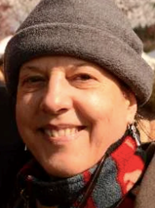
Luisa Maffi
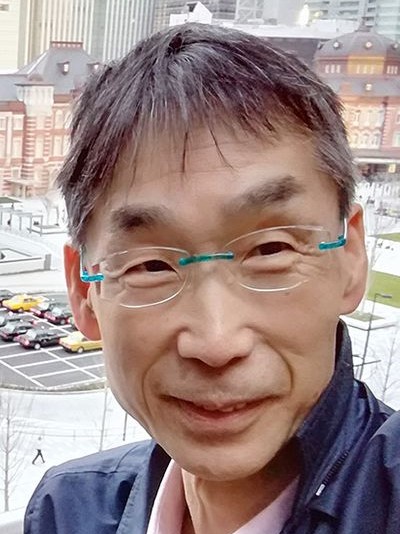
©Hiroshi Maruyama
Hiroshi Maruyama is Professor Emeritus at the Muroran Institute of Technology in Japan. The main focus of his research previously lay in rural Japanese locals’ struggle for social justice, local autonomy, and sustainability throughout their conflict with authorities over natural exploitation. Since the 2000s, he has been devoted to comparative Indigenous policy studies based in Finland and Sweden. In December 2016, he founded the Centre for Environmental and Indigenous Policy Studies (CEMiPOS) to collaborate with international researchers, artists and Indigenous activists towards decolonisation. Since then, CEMiPoS has published solidarity statements, articles and UN submissions, and organised international seminars and conferences; the Centre has been accepted as a Member of the ICCA Consortium in the current round. In 2016, Hiroshi was awarded an honorary doctorate from Uppsala University.
Roberto May Caamal is an Indigenous member of the Pedro Moreno community in Quintana Roo, México. He is also an Engineer in Agroecological Production Systems in the Intercultural Mayan University of Quintana Roo (UIMQROO) and has a Bachelor of Law from the Inter-American University for Development. He has extensive experience working with members of the Network of Environmental Services Producers Civil Association (REPSERAM, accepted as a Member in the current round), located in the municipality of José María Morelos, Quintana Roo, Mexico, providing legal advice on agrarian matters, drafting internal regulations and updating the list of members of REPSERAM to strengthen governance in the commons.

© Roberto May Caamal
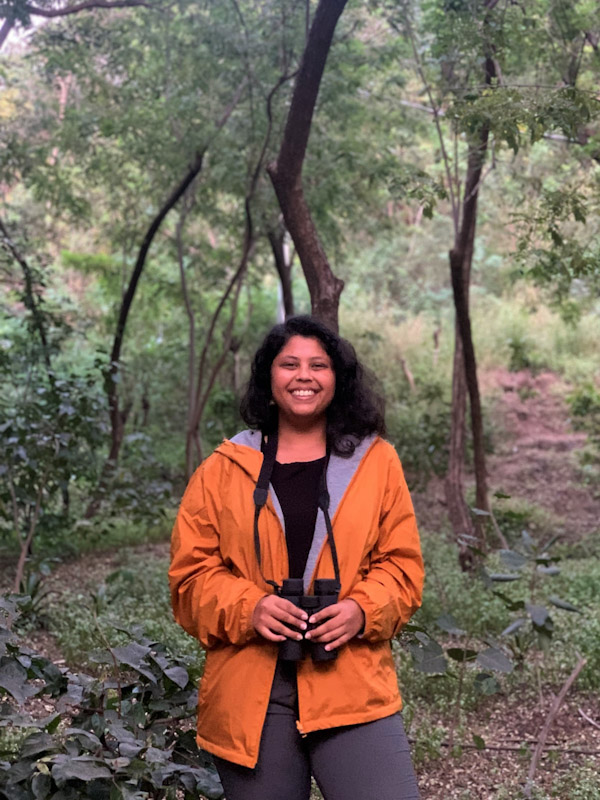
© Ramya Nair
Ramya Nair has been living among and working with different Indigenous Peoples in India for over three years, trying to understand their ways of life, interactions with and beliefs of nature. Most recently, she has been leading a collaborative research and conservation project with the Indigenous Yimkhung Nagas in the state of Nagaland along the India-Myanmar border. Their work so far has involved conducting ecological surveys to document biodiversity, anthropological surveys to understand Indigenous knowledge systems and peoples’ relations with nature, engaging with local governing bodies like the village council and students’ union, and building local conservation capacity through training and workshops.
Stephen Nindi is the Principal Research Officer at Tanzania Wildlife Research Institute. He holds a PhD in Political Ecology from Kyoto University, Japan, an MSc (Agricultural Engineering – Land Use Planning and Water Management Studies) from Sokoine University of Agriculture, Tanzania, and an Honours BA (Land Use Planning & Environmental Studies) from University of Dar es Salaam, Tanzania. He has over 20 years of proven experience in leading the implementation of several programs in Tanzania, Kenya, Uganda, Liberia, Sweden and Mozambique, focusing on sustainable land resources planning and management, ecosystems and biodiversity conservation, wildlife management, agricultural and rural development, environmental management, climate change adaptation and food security, and impact studies on livelihoods that integrate nature-human-worldview interactions as a basis for sustainable community development. He has recently accomplished an assessment of ICCAs—territories of life in Tanzania.
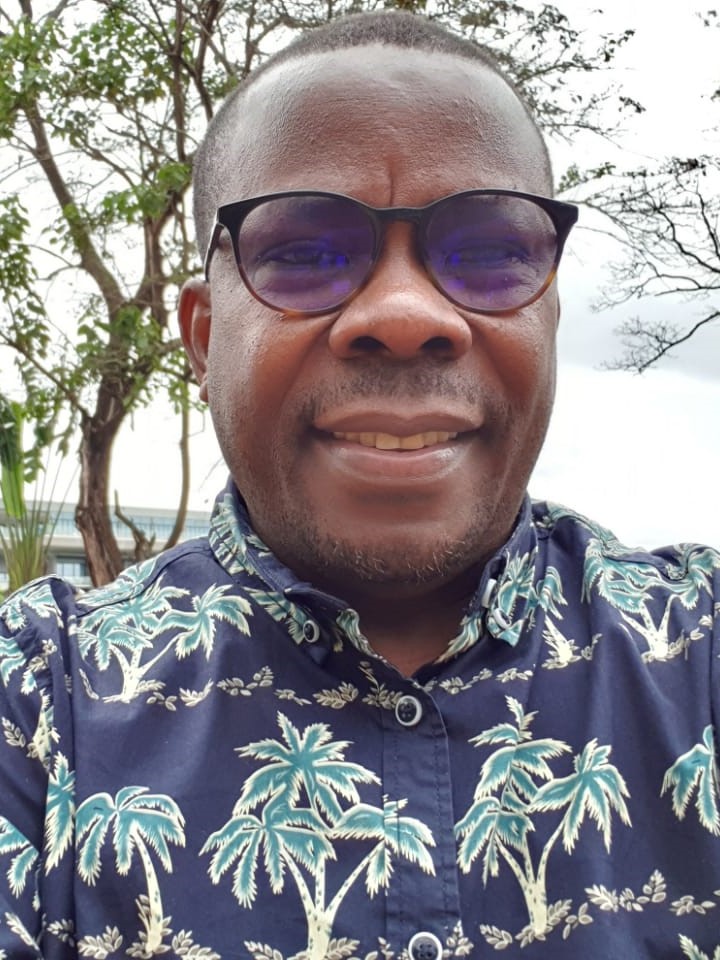
© Stephen Nindi
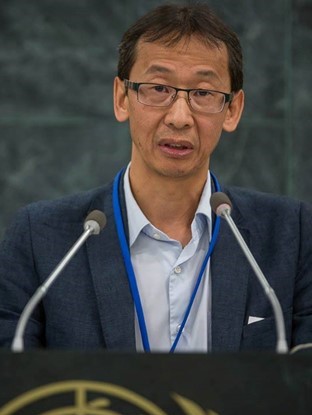
© Rodion Sulyandziga
Rodion Sulyandziga has many years of experience working on the promotion and protection of Indigenous Peoples’ rights in Russian Siberia at the local and global levels, including UN human rights mechanisms and bodies. As an Udege Indigenous person, he has first-hand knowledge of challenges faced by Indigenous Peoples in his region. Through his international and regional advocacy, documentation and research, Rodion is a well-recognized promoter of the rights of Indigenous Peoples. He has been the co-chair of the International Indigenous Peoples Forum on Climate Change (2012-2016) and Indigenous Peoples Global Coordination Committee of the UN High Level Plenary/World Conference on Indigenous Peoples (2014). He has PhD in Social Science and is a member of the UN Expert Mechanism on the Rights of Indigenous Peoples.
Sandeep Virmani is an environmentalist with training in architecture. Based in Kutch, India, over the past 30 years he has worked with communities throughout the country, celebrating their traditional knowledge in water management, food production, animal breeds and seed conservation, natural building and wildlife conservation. He has set up two organizations, the Hunnarshala Foundation, which works on built habitats, and Sahjeevan, which works on ecosystem management with Indigenous communities. Along with other colleagues, Sandeep has also been instrumental in initiating the Center for Pastoralism in India.
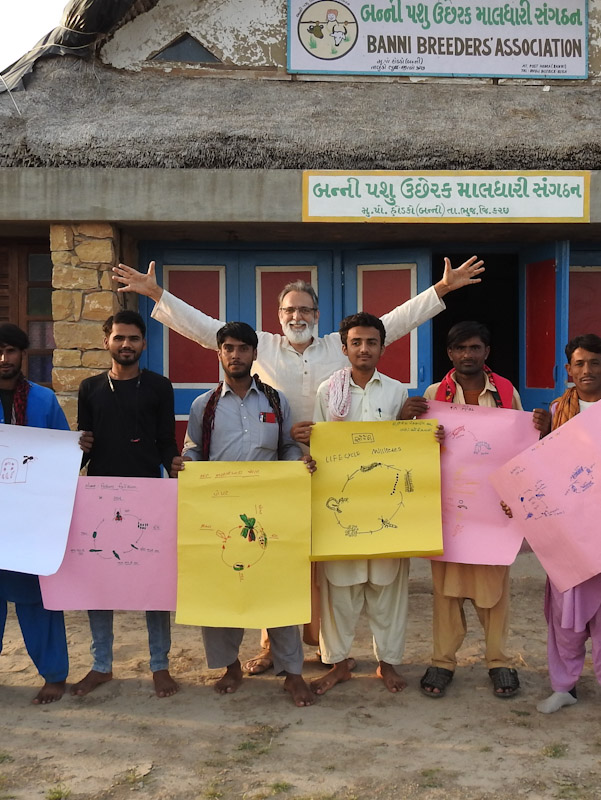
© Sandeep Virmani
The 2019 General Assembly, Udaipur, India (c) ICCA Consortium
